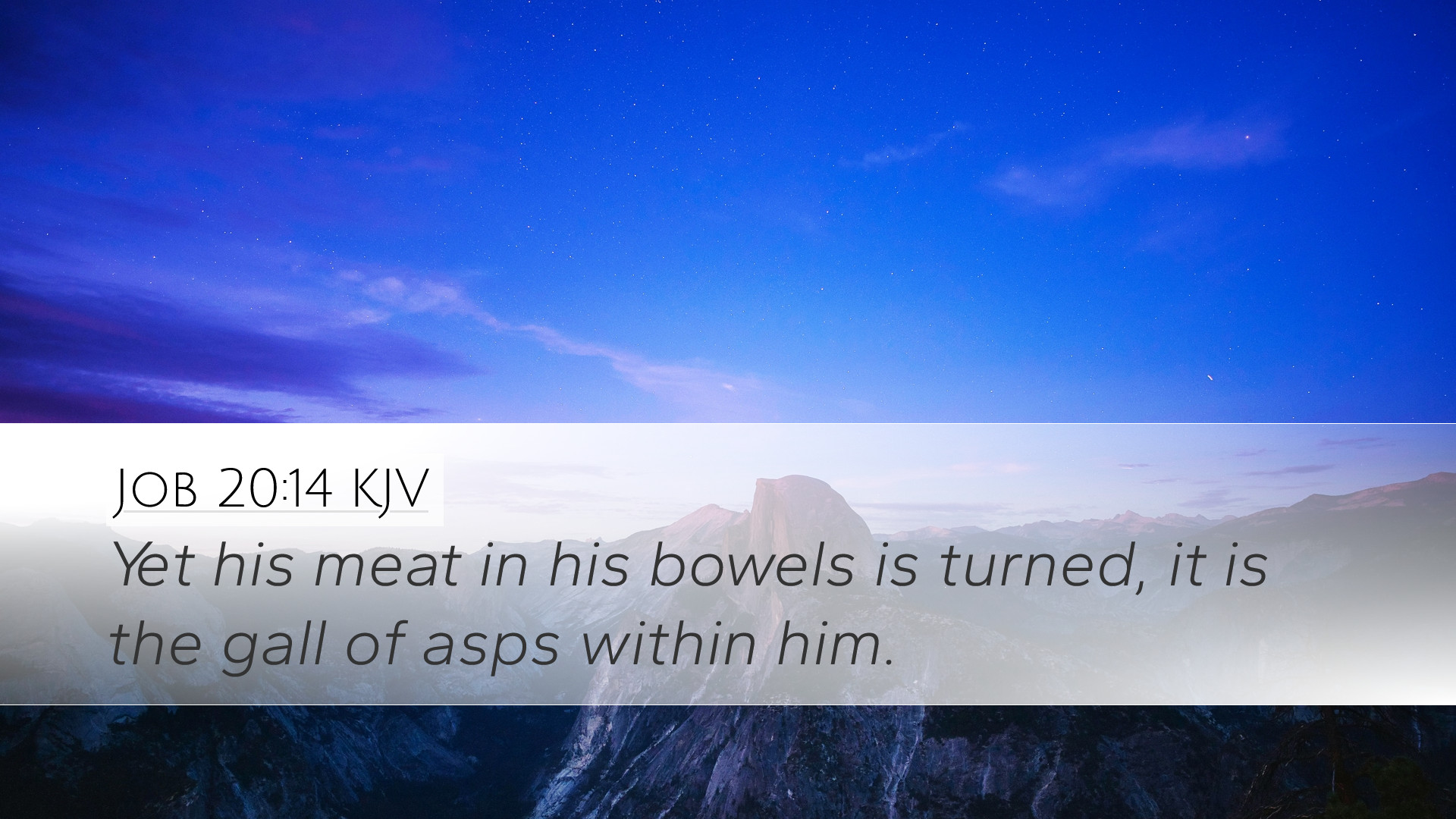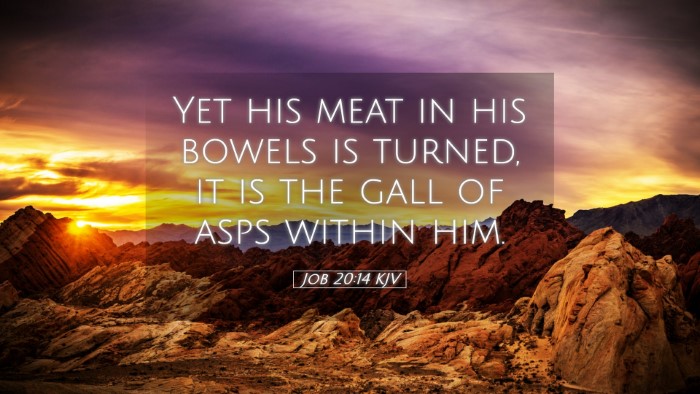Old Testament
Genesis Exodus Leviticus Numbers Deuteronomy Joshua Judges Ruth 1 Samuel 2 Samuel 1 Kings 2 Kings 1 Chronicles 2 Chronicles Ezra Nehemiah Esther Job Psalms Proverbs Ecclesiastes Song of Solomon Isaiah Jeremiah Lamentations Ezekiel Daniel Hosea Joel Amos Obadiah Jonah Micah Nahum Habakkuk Zephaniah Haggai Zechariah MalachiJob 20:14
Job 20:14 KJV
Yet his meat in his bowels is turned, it is the gall of asps within him.
Job 20:14 Bible Commentary
Commentary on Job 20:14
Job 20:14 states, "Yet his meat in his bowels is turned; it is the gall of asps within him." This verse, part of Zophar the Naamathite's discourse, encapsulates the essence of the fleeting joys of the wicked and the bitterness that ultimately pervades their lives. The context of this verse hinges on Zophar's portrayal of the fate of the ungodly and their moral decay.
Contextual Understanding
The book of Job presents a profound exploration of suffering, justice, and divine sovereignty. It primarily revolves around Job's reactions to his unimaginable losses, inviting various perspectives from his friends regarding the nature of his affliction. Job 20 is Zophar's second speech, where he brings a sharper condemnation towards Job, accusing him of secret sins that have led to his suffering.
Insights from Matthew Henry
Henry emphasizes the psychological and spiritual dynamics at play. He notes that Zophar articulates the notion that the wicked's pleasure is only temporary. Henry writes about the internal transformation that occurs within those who pursue earthly pleasures devoid of righteousness. He vividly describes how the 'meat'—symbolizing the delights and pleasures that one indulges in—becomes bitter and poisonous.
- Temporary Enjoyment: The satisfaction of the wicked is likened to a momentary feast that eventually turns toxic.
- Inner Turmoil: The imagery of 'gall of asps' illustrates the severe internal conflict and torment that accompanies a sinful life.
- Divine Retribution: According to Henry, the verse symbolizes how God allows the bitter fruits of one's actions to manifest within them.
Reflections by Albert Barnes
Barnes expands on the implications of the metaphor crafted by Zophar. He posits that the consumption of ‘meat’ signifies the acceptance of worldly pleasures, whereas the subsequent ‘gall’ indicates that these pleasures become destructive. Barnes interprets the snake's gall as a profound symbol of sorrow and regret that ultimately ensues from a life of sin.
- Symbolic Interpretation: Meat symbolizes mundane and ephemeral joys, while the gall signifies spiritual lamentation.
- Contrast of Outcomes: Barnes highlights the stark contrast between the apparent successes of the wicked and their eventual devastation.
- Psychological Disillusionment: He alludes to how this internal gall is representative of disillusionment that accompanies earthly pursuits.
Adam Clarke’s Contributions
Clarke provides an exegetical look at the text, situating it within the moral compass of the narrative. He insists that Zophar's words reflect a larger truth about the moral order of the universe: that enjoyment derived from iniquity carries an inherent consequence.
- Moral Consequence: Clarke underlines the intrinsic relationship between one's actions and the eventual repercussions, positing that joy derived from sinful acts turns to regret.
- Visual Imagery: He meticulously describes the corrosive nature of what might be viewed as sweet in the beginning—a metaphor illustrating how sin promises satisfaction yet leaves bitterness in its wake.
- Spiritually Wounded: Clarke suggests the image of gall represents a soul wounded by its own choices, facing the internal reality that accompanies ungodliness.
Theological Implications
Job 20:14 invites deep theological reflection on human nature, sin, and the justice of God. The underlying principle suggests that the allure of sin may captivate, yet it ultimately leads to destruction. The commentary from Henry, Barnes, and Clarke uniquely converges to highlight:
- The Nature of Sin: Sin appears to be delightful initially but ends in bitterness.
- Divine Justice: The passage supports the notion of divine justice where every sinner will reap the consequences of their actions.
- Examination of Pleasure: Believers are prompted to reflect on their indulgences and consider whether they lead to spiritual health or corruption.
Practical Applications for Today's Believer
The truths contained within Job 20:14 resonate deeply within contemporary contexts:
- Self-Reflection: Individuals are encouraged to examine their lives for hidden sins that may bring temporary pleasure but lead to long-term pain and regret.
- Accountability: The verse fosters a culture of accountability within the community of faith, urging believers to support one another in pursuing righteousness.
- Hope in Deliverance: For those struggling with guilt and the consequences of sin, this passage serves as a reminder of God’s grace and the possibility for redemption.
Conclusion
In summary, Job 20:14 serves as a powerful reminder of the nature of sin and its consequences. Through the insights of Henry, Barnes, and Clarke, readers gain a multifaceted understanding of how fleeting worldly pleasures can lead to deep spiritual torment. This passage not only provides insight into the experiences of the wicked but also calls believers to live with integrity, recognizing the eternal implications of their choices.


